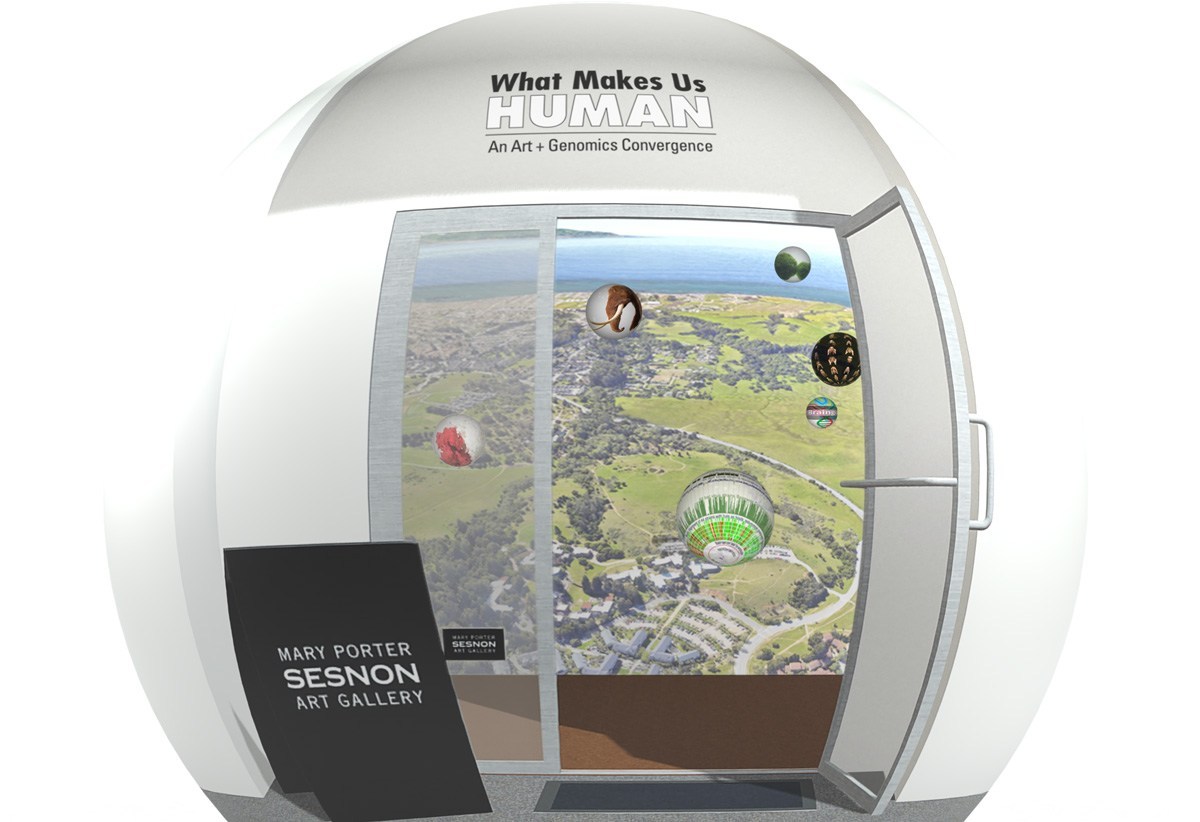
What Makes Us Human: An Art + Genomics Convergence
The event will feature a tour of the virtual exhibition hub and a panel discussion with artists Angélica Dass and Gina Czarnecki signing in from Spain and the UK, and David Haussler, Scientific Director of the Genomics Institute at UC Santa Cruz. Moderated by curator Jennifer Parker, and Isabel Bjork, Executive Director of the Genomics Institute, with introductions by Shelby Graham, Sesnon Gallery Director.
Opening webinar event
November 12, 2020, 12:00–1:00pm PST
Register for Zoom link here
This event will be recorded and available for future view.
What Makes Us Human: An Art + Genomics Convergence
To coincide with the twentieth anniversary of UC Santa Cruz posting the assembled human genome to the internet, the exhibition What Makes Us Human: An Art and Genomics Convergence assembles contributions from researchers at the cutting edge of their fields in the arts, the humanities and the sciences.
The unfolding pandemic has triggered an existential reckoning over our conceptions of place and human encounter. Twenty years after UC Santa Cruz posted the assembled human genome to the internet, we find ourselves redefining and expanding genomics while masked and socially distanced. Simultaneously, the uprisings for Black lives and all silenced and underrepresented identities have brought visibility, urgency and profound pause.
What Makes Us Human takes the doors off the traditional gallery, imagining a space which transcends those walls. Visitors will see connections between diverse academic disciplines from unique and collaborative lenses of the arts, sciences, and humanities.
Some of the inquiry conducted by these collaborators examines what it means to be something other than human, simultaneously helping reveal what makes us human. How do we talk about our humanness? Which of our taxonomies intersect? And how can (virtual) space facilitate more of these intersections? How are humans furthering creative, scientific, and scholarly research while responding to the pandemic in our institutions, in our bodies, in our environments and in our communities? How can researchers be alone together and work collectively -- questioning, testing, and collaborating during COVID to educate communities at the intersection of art, culture, science, and politics?
This exhibition will showcase the multifaceted approach of artists, humanists, and scientists working across disciplines to investigate art and genetics. Spearheaded by OpenLab Collaborative Research Center in collaboration with the Mary Porter Sesnon Gallery in the Arts Division, UC Santa Cruz. This initiative is designed to establish a platform for researchers to collaborate and exchange ideas.
Collaborators:
A.M. Darke, Alexa Burrell, Amy Youngs, Angélica Dass, ASSIST Lab, Avital Meshi, Brad Necyk, Center for Public Philosophy, Danielle Siembieda, Dorothy Santos, Enrique Leal, the UC Santa Cruz Genomics Institute, Gina Czarnecki, Heather Dewey-Hagborg, Jenny Reardon, Jessie Kendall-Bar, Karolina Karlic, OpenLab Collaborative Research Center, UC Santa Barbara Gaucho OpenLab Initiative, Paloma Medina, Phylum (Carlos Castellanos, Johnny DiBlasi, Bello Bello), The Algae Society, The Kenneth S. Norris Center for Natural History, UCSC Astrobiology, UCSC Earth Futures Initiatives, UCSC Institute of the Arts and Sciences, Zac Zimmer, Zach Corse
What Makes Us Human is sponsored by a multi-campus research initiative grant in support of UC Placemaking, the UC Santa Cruz Arts Division, OpenLab Collaborative Research Center, UC Santa Cruz Genomics Institute, and Leonardo/The International Society for the Arts, Sciences and Technology (Leonardo/ISAST).
Jennifer Parker is an artist and professor of Art and Digital Art & New Media at the University of California Santa Cruz where she is the founding Director of the OpenLab Collaborative Research Center.
